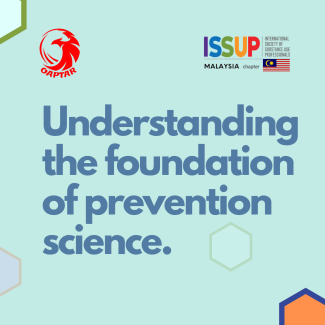Understanding the foundation of prevention science.

What is Prevention Science?
In essence, prevention science is the systematic study of factors that influence health and well-being, with the ultimate goal of preventing negative outcomes before they occur.
The European Prevention Curriculum (EPC) defines it as "the scientific study of the development, implementation, and evaluation of interventions designed to prevent mental health and addictive disorders and to promote mental health and well-being."
Prevention science is a multi-disciplinary field that aims to prevent mental, emotional and behavioral issues like substance use before they start or escalate.
At its core, prevention science is a proactive approach to public health. It involves understanding the causes or risk factors that can lead to these problems and designing interventions to address those risks.
This definition highlights the broad scope of prevention science, which can be applied to a wide range of health issues beyond mental health and substance use disorders.
Substance use prevention aims to stop or delay people from beginning to use psychoactive substances.
It can also help those who have started to use to avoid the development of substance use disorders and associated health and social problems.
Prevention also has a broader intent: to encourage the healthy and safe development of children and young people, so they can realise their talents and potential. It does this by helping them positively engage with their families, schools, peers, workplace and society.
Foundations from Multiple Disciplines
Prevention science draws key principles and theories from multiple other disciplines like psychology, sociology, public health, education and more. Some of the foundational theories that guide prevention science include:
- Social Learning Theory - People learn behaviors by observing and modeling others.
- Problem Behavior Theory - Risky behaviors tend to cluster and have common roots that interact with the environment.
- Ecological Systems Theory - Individual behavior is influenced by complex interactions. between the individual and their contexts like family, community, culture.
- Theory of Planned Behavior - Behaviors are guided by attitudes, subjective norms, and perceived control.
By combining insights from multiples fields, prevention science provides a comprehensive, multi-level understanding of how individual traits, social relationships, environments and societal factors can shape behaviors and mental health.
A Look Back: The History of Prevention Science:
The roots of prevention science can be traced back to the early days of public health. For centuries, societies have implemented measures to prevent the spread of infectious diseases, such as quarantines and improved sanitation practices.
However, the field truly began to flourish in the 20th century, with advancements in epidemiology, social sciences, and psychology.
These advancements allowed researchers to develop more sophisticated models for understanding the causes of health problems and to design targeted interventions.
Core Principles
Prevention science is guided by several key principles:
- Multi-Level Approach: Prevention efforts can be targeted at individuals, communities, and entire societies. A comprehensive approach considers all these levels to maximize impact.
- Developmental perspective - Prevention scientists identify factors that increase the likelihood of negative outcomes (risk factors) and those that can lessen that risk (protective factors). This knowledge is then used to design interventions that target these factors. Risk and protective factors differ across life stages, so approaches need to be developmentally appropriate.
- Epidemiology - Understanding patterns of issues in specific populations is critical.
- Ecological viewpoint - Behavior results from complex interactions between the individual and their nested contexts.
- Understanding motivation and mechanisms of change leads to more effective interventions.
- Transdisciplinary approaches provide richer insights.
- Upholding ethics, human rights and social justice is paramount. Prevention science recognizes the importance of addressing social determinants of health, such as poverty and discrimination, which can create disparities in health outcomes. Prevention programs should be designed to be equitable and accessible to all.
Evidence-Based Interventions
Ultimately, these theoretical foundations guide the development, testing and implementation of prevention interventions that are based on rigorous scientific evidence. Effective prevention programs are designed to target key risk and protective factors in a developmentally and contextually appropriate way.
By building on established theories and continuously incorporating new empirical evidence, prevention science provides a strong basis for creating comprehensive interventions that can improve individual and public health in powerful ways.
Prevention science is a dynamic and ever-evolving field. By applying scientific principles and best practices, we can develop effective interventions that promote health, well-being, and ultimately, a healthier future for all. In our upcoming blog posts, we'll delve deeper into how prevention science translates into action, exploring the design and implementation of evidence-based prevention programs and their impact on various health issues. Stay tuned!